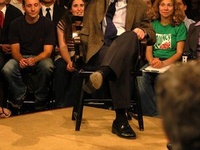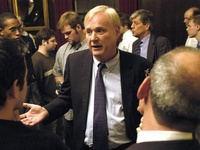Chris Matthews sits in his room in The Charles Hotel three hours before the sixth and final segment of “Hardball: Battle for the White House.” His eyes slide between the number pad of his cell phone, a pile of potential questions on the table and the TV in the corner (tuned to CNN—The Charles doesn’t get MSNBC, he explains).
In addition to “Hardball,” which airs every weeknight, Matthews hosts CNBC’s “The Chris Matthews Show” on Sundays. He’s written four books. He has three children. He’s a busy guy, but he never stops absorbing information.
“I write a lot, I read a lot,” he says.
On his shows, Matthews’ converts this arsenal of information into rapid-fire questions.
“He has the ability to keep a program moving quickly and [engage] the audience, which for a television program is absolutely essential,” says Dunster House Master and IBM Professor of Government and Business Roger B. Porter, who attended the taping of last night’s interview with Democratic presidential candidate Wesley K. Clark.
Matthews’ style can be traced to the hero of his college days, controversial newspaper columnist Joe McGinnis.
Matthews recalls a radio show which began with the host asking, “What did you think of McGinnis today?”
Like McGinnis, Matthews strives each day to provoke his guests—and thus provoke a national debate.
From Politics to Punditry
Matthews began his career in politics, writing speeches for Jimmy Carter and serving on the staffs of two senators and House leader Tip O’Neill.
He says the experience writing speeches prepared him for opinion journalism.
Matthews wrote a nationally syndicated column for the San Francisco Chronicle for two years and now does 80-second commentaries on “The Chris Matthews Show.”
“A speechwriter will become a good columnist,” he says, citing William Safire, Peggy Noonan and Charles Krauthammer as other examples. “It’s production of opinion, writing for yourself and hearing your own sound.”
Matthews’ experience in politics has lent him a unique perspective as a journalist, according to David R. Gergen, a professor of public service at the Kennedy School of Government, White House adviser to four presidents and former editor of U.S. News and World Report.
“He’s worked on two branches of the government and in journalism,” Gergen said. “He’s not only been on the outside looking in, he’s been on the inside looking out.”
Read more in News
Black Female Alums Celebrate Third Decade















